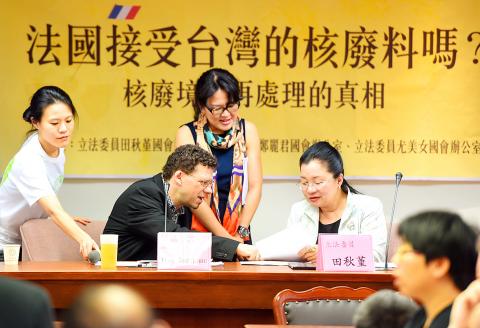The international community has stopped the practice of shipping nuclear waste overseas for reprocessing, and state-run Taiwan Power Co’s (Taipower) plan to do so is just delaying nuclear waste management, French nuclear safety expert Yves Marignac said yesterday.
Speaking at a news conference in Taipei, the director of French non-profit nuclear energy consultancy World Information Service on Energy (WISE-Paris) said that Taiwan’s spent fuel pools reaching capacity and Taipower’s plan to reprocess highly radioactive nuclear waste are two separate issues that should not be discussed in the same context.
Taipower in February issued an online call for bids to solicit overseas contractors to reprocess about 1,200 bundles of spent fuel rods from the Jinshan and Guoshan nuclear power plants in New Taipei City, for which the company has requested a budget of NT$11.25 billion (US$362.9 million).

Photo: Liao Chen-huei, Taipei Times
Taipower officials have said that the project is a “contingency plan” to resolve storage problems arising from the New Taipei City Government’s rejection of the company’s dry-cask storage project because of safety concerns.
Marignac said it is wrong to consider nuclear waste reprocessing or any interim waste management options, as any nuclear waste management plan should be viewed from a long-term perspective, instead of seeking expedient, short-term solutions.
He said that most countries that used to provide nuclear waste reprocessing, such as the UK and Russia, are either phasing out or have abandoned the technology.
Furthermore, countries that used to ship nuclear waste abroad for reprocessing — such as Germany, Belgium, Italy, Japan and Switzerland — have abandoned the practice, he said.
They ended the practice because 30 to 40 years after nuclear waste is reprocessed, they still have to deal with the remaining radioactive materials, such as plutonium, Marignac said.
With only one nuclear reactor of a Dutch firm still relying on overseas nuclear waste reprocessing, he said that Taipower’s plan is one aimed at “raising the dead.”
As for Taipower Department of Nuclear Back-end Management director Wu Tsai-ji’s (吳才基) comment that the overseas reprocessing plan was “experimental” and would involve only a small batch of spent fuel rods, Marignac said that the “experiment” would require at least 20 years before coming to any conclusions, and the time would be better spent exploring other ways to address the problem.
Taipower’s proposal would only complicate nuclear waste management, as Taiwan would have to put energy into the reprocessing project and would still face the possibility of radioactive materials being shipped back when the contract expires, he said.
As to news that AREVA has won the Taipower bid, Marignac said that the French nuclear waste reprocessing firm is mired in financial problems and warned of a scenario wherein AREVA demands more fees for its service after the contract is executed.
In response, Wu said that AREVA is not the only company being considered by Taipower.
He said that no radioactive materials would be shipped back to the nation according to a clause in a contract.
“Any remaining materials will be the contractor’s responsibility to deal with, in its own country,” he said.
The contract also contains a clause that says Taipower reserves the right terminate cooperation prematurely if problems should occur, he said.

Taipei has once again made it to the top 100 in Oxford Economics’ Global Cities Index 2025 report, moving up five places from last year to 60. The annual index, which was published last month, evaluated 1,000 of the most populated metropolises based on five indices — economics, human capital, quality of life, environment and governance. New York maintained its top spot this year, placing first in the economics index thanks to the strength of its vibrant financial industry and economic stability. Taipei ranked 263rd in economics, 44th in human capital, 15th in quality of life, 284th for environment and 75th in governance,

The Sports Administration yesterday demanded an apology from the national table tennis association for barring 17-year-old Yeh Yi-tian (葉伊恬) from competing in the upcoming World Table Tennis (WTT) United States Smash tournament in Las Vegas this July. The sports agency said in a statement that the Chinese Taipei Table Tennis Association (CTTTA) must explain to the public why it withdrew Yeh from the WTT tournament in Las Vegas. The sports agency said it contacted the association to express its disapproval of the decision-making process after receiving a complaint from Yeh’s coach, Chuang

Control Yuan Secretary-General Lee Chun-yi (李俊俋) tendered his resignation last night, admitting that he had misused a government vehicle, as reported by media. His resignation was immediately accepted by the Control Yuan. In a statement explaining why he had resigned, Lee apologized for using a Control Yuan vehicle to transport his dog to a pet grooming salon on May 20. The issue first came to light late last month, when TVBS News reported that Lee had instructed his driver to take the dog to the salon. The news channel broadcast photos that it said were taken by an unnamed whistle-blower, which purportedly showed the

A former officer in China’s People’s Liberation Army (PLA) who witnessed the aftermath of the 1989 Tiananmen Square massacre has warned that Taiwan could face a similar fate if China attempts to unify the country by force. Li Xiaoming (李曉明), who was deployed to Beijing as a junior officer during the crackdown, said Taiwanese people should study the massacre carefully, because it offers a glimpse of what Beijing is willing to do to suppress dissent. “What happened in Tiananmen Square could happen in Taiwan too,” Li told CNA in a May 22 interview, ahead of the massacre’s 36th anniversary. “If Taiwanese students or